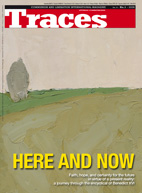
Traces N.1, January 2008
That Known UnknownHere are some excerpts from Ubaldo Casotto’s interview with Fr. Stefano Alberto, published in the Italian daily, Il Foglio, December 15, 2007. We believe it offers the best perspective on the encyclical Spe Salvi and on the work proposed in this month’s “Close Up” section.
The Pope is inviting us, challenging us, to ask ourselves what we truly desire. “So what do we really want?… what in fact is ‘life’?” (11), questions that echo the one Jesus asked the first two who followed Him in John’s Gospel: “What are you looking for?”(1:38). The Pope puts man once again before this question, which expresses the immensity of his desire because, he says, citing St. Augustine, “we have no idea what we ultimately desire…” At the same time, Benedict XVI asks contemporary thought to account for the reduction it has brought about, for the dead-end into which it has led man’s infinite need for the infinite, exalting, yes, his individual desire, but in fact throwing tremendous suspicion on it, because it does not give it horizon or perspective, or depth; it aims to solve everything in the short instant. Whereas, as Cesare Pavese says in The Art of Living, “What man looks for in pleasure is an infinite and no one would ever give up hope of obtaining this infinity.” […]
“God strengthens our desire,” he says, quoting St. Augustine. In the end, Christian hope is nothing other than the hope of Christian desire, but in its content it carries a different world (not another world): the certainty of Christ’s presence. Thus is human desire taken seriously at its deep root, in its powerful dynamism that longs for the infinite: “something we do not know towards which we feel driven,” the Pope says. At a certain point, he uses a stupendous definition, which shows how free and courageous he is: “A known unknown.”[…]
Faith that becomes hope “draws the future into the present.” This is the reaffirmation that the Christian experience is possible, and at the same time the accusation of the reduction of faith and hope to subjective effort. Hope looks to the future starting from a present certainty; Christian hope is a certain possession, and this certainty is Christ, recognized as present now. […]
The Pope frees Christ from restriction within the guise of a moralist or an eschatological prophet, where much exegesis would like to relegate Him, reducing Him in the end to a “strange” character, alien to true human questions. He is truly a dramatic presence, who asks us what our true desire is, who introduces us to the root of reality, and does it with radical questions: “What are you looking for? What use is it if you gain the whole world and then lose yourself? What can a man give in exchange for his life?” Christ, the way, the truth, and the life, is lover of the destiny of man who takes his desire for happiness seriously, even through and beyond death. Before this reaffirmation of the positivity of man’s desire, doubt–which many intellectuals hold to be the only methodological position for discovery and knowledge–appears as a freezing of desire itself. Instead, Benedict XVI says, every desire is a prophecy of the infinite, as Giacomo Leopardi quite rightly glimpsed in his Hymn to His Lady, whose beauty referred him back to an ultimate root, to that Beauty without which no beauty is such. Leopardi cries, “the unknown lover” of the Beauty he sensed (and for this reason is a prophecy of Christ, as Fr. Giussani suggestively always told us): “If thou among the eternal / ideas, are numbered, which the eternal mind / deigns not should e’er be clothed in fleshly form…” The drama is to take seriously, to the end, the suggestion of this fleshly form.